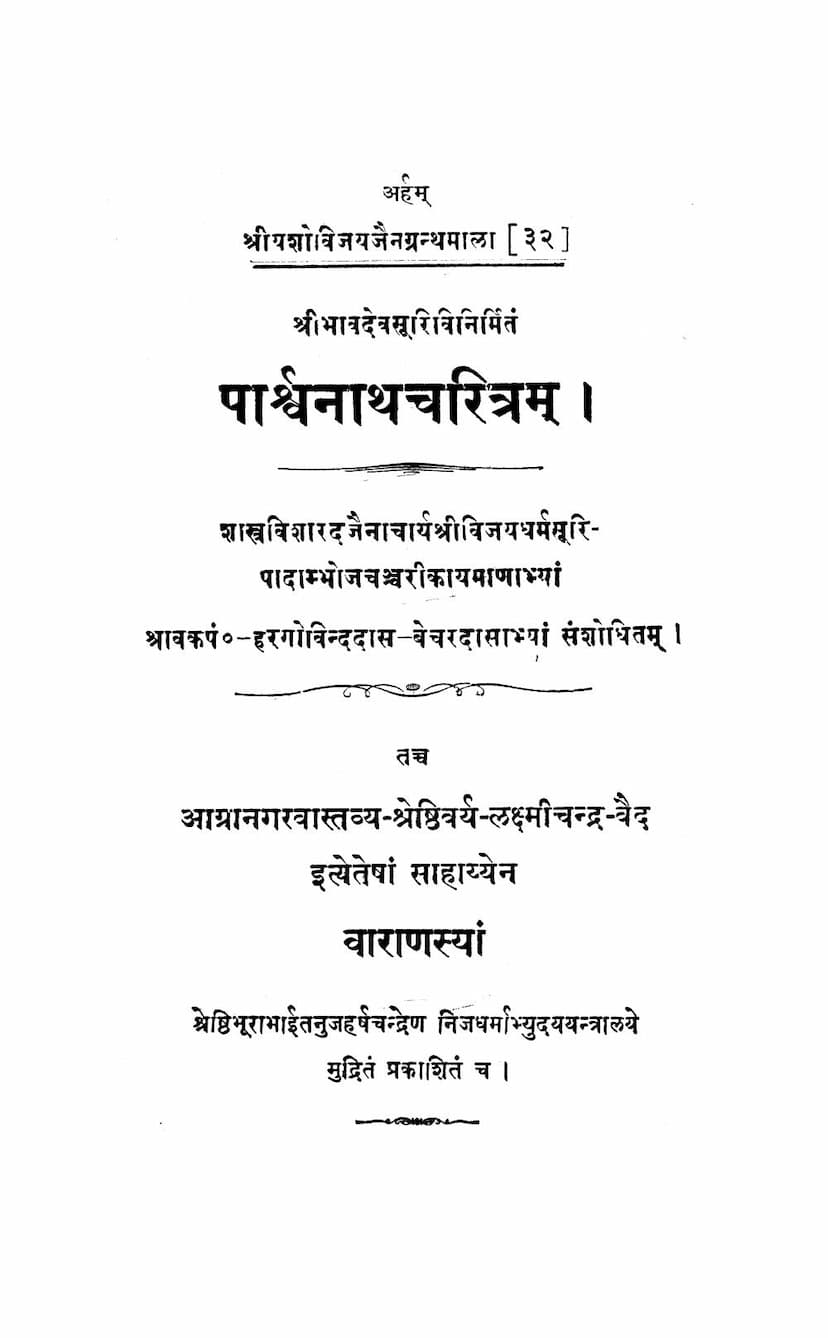Parshwanath Charitra
Added to library: September 2, 2025

Summary
Here's a comprehensive summary of the provided Jain text, "Parshwanath Charitra," based on the given pages:
Title: Parshwanath Charitra (Life of Parshvanatha)
Author: Shree Bhava Deva Suri
Edited by: Shravak Pandit Hargovinddas and Shravak Pandit Bechardas
Publisher: Harshchand Bhurabhai, Proprietor of Dharmabhyudaya Press, Benares
Veer Era: 2438 (corresponds to 1911-1912 CE)
Key Information and Contents:
-
About the Text: The "Parshwanath Charitra" is a Mahakavya (epic poem) authored by Shree Bhava Deva Suri. It is dedicated to the life and deeds of Lord Parshvanatha, the 23rd Jain Tirthankara. The text is presented as a significant work within Jain literature.
-
Editorial and Publishing Efforts: The text was meticulously edited by Shravak Pandit Hargovinddas and Shravak Pandit Bechardas, who are described as devoted servants of His Holiness Shastra Visharad Jainacharya Shri Vijaya Dharma Suri. The publication was made possible with the financial assistance of Seth Lakshmichand Vaiad of Agra. Harshchand Bhurabhai printed and published the work. The text belongs to the Yashovijaya Jaina Granthamala series, specifically volume 32.
-
Author's Lineage and Historical Context: The introduction (Prastavana) attempts to place Shree Bhava Deva Suri within the lineage of the Kalikacharya tradition. Based on the text, it is inferred that Shree Bhava Deva Suri lived between the 13th and 14th centuries CE. The introduction highlights the author's mastery of grammar (Vyakaran), poetic excellence (Kavi Kul Guru), knowledge of worldly sciences (Laukika Shastra), expertise in palmistry (Samudrik Shastra), understanding of medical secrets (Chikitsa Rahasya), and profound knowledge of Jain scriptures (Jina Agama).
-
Content of the Parshwanath Charitra:
- The epic is structured into eight chapters (Sarga).
- It details Lord Parshvanatha's lives across eight different births (Bhav).
- The narrative covers his birth as Nabhinath (which is actually the first Tirthankara Rishabhanatha, likely a genealogical or spiritual connection being drawn here by the author), his subsequent births, his renunciation, his attainment of Kevala Jnana (omniscience), his Samavasarana (divine assembly), his teachings (Deshna), the description of his disciples and attendant deities (Shasan Deva), his travels (Vihar), and his Nirvana (liberation).
- The text emphasizes Lord Parshvanatha's role in uprooting the cycle of birth and death, quelling anger, overcoming pride and ego, and dispelling illusion. His life is portrayed as a source of divine guidance and spiritual wisdom.
- The work incorporates numerous didactic stories and anecdotes that offer moral and spiritual advice. It also includes insights into medical sciences and knowledge of physiognomy (Shubha-Ashubha Abhigyana).
- The text is presented as a Mahakavya, containing rich descriptions and profound philosophical concepts.
-
Genealogical Information (Vamsha Prashasti): Page 9 onwards includes a detailed lineage (Vamsha Prashasti) of the patrons and contributors, particularly focusing on the family of Seth Lakshmichand Vaiad of Agra. It traces his ancestry, highlighting his forefathers' contributions to Jainism, such as building temples and installing idols. This section also mentions Emperor Akbar and his relationship with Jain Acharyas, suggesting a connection to the wider historical and cultural context.
-
The First Chapter (Pratham Sarg): The initial chapter begins by describing the virtuous life of Lord Parshvanatha, focusing on his virtues of detachment, renunciation, and overcoming worldly desires. It recounts his past lives, leading up to his eventual birth as Parshvanatha. The narrative style emphasizes philosophical depth and the eradication of negative qualities like pride, anger, and delusion. The stories within the text aim to illustrate the principles of Jainism and the path to liberation.
-
Key Themes and Values: The summary highlights themes of karma, renunciation, wisdom, compassion, detachment from worldly pleasures, and the pursuit of spiritual liberation (Moksha). The life of Lord Parshvanatha is presented as an ideal example for followers to emulate.
In essence, "Parshwanath Charitra" is a detailed and devotional epic recounting the illustrious lives and virtues of Lord Parshvanatha, compiled with scholarly diligence and presented as a valuable contribution to Jain literature.